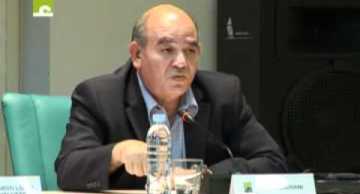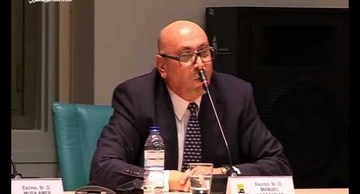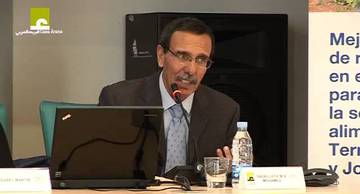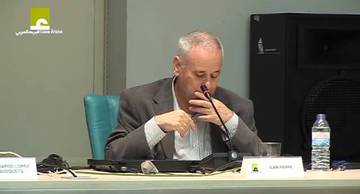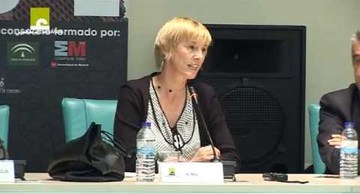

Nakba at 73: what lies ahead?
Publicado el 12 de mayo 2021
TODOS LOS VÍDEOS DE ESTA CATEGORÍA
-
Palestina y los cambios políticos en la región árabe, a cargo de Raji Sourani
Vídeo de la conferencia ofrecida por Raji Sourani, director del Centro Palestino para los Derechos Humanos (PCHR, Gaza), y Uri Davis, académico y activista pro derechos humanos en Israel, presentada por Eduardo López Busquets, director general de Casa Árabe, el 16 de mayo de 2012 en Casa Árabe en Madrid como conmemoración de la Nakba palestinaPublicado el 11 de junio 2014 -
Palestina e Israel: El futuro de la solución de dos estados, a cargo de Manuel Hasassian
Conferencia celebrada el jueves 29 de noviembre de 2012, coincidiendo con el Día Internacional de solidaridad con el Pueblo Palestino, y organizada por Casa Árabe y la Misión Diplomática de Palestina en España. La ponencia corrió a cargo de Manuel Hassassian, embajador de Palestina en Reino Unido, quien fue presentado por Musa Amer Odeh, embajador de Palestina en España, y por Eduardo López Buquets, director general de Casa Árabe. Más información: http://www.casaarabe.es/noticias-arabes/show/conferencia-palestina-e-israel-el-futuro-de-la-solucion-de-dos-estadosPublicado el 11 de junio 2014 -
La escasez de agua en Palestina y Jordania / The Water Shortage in Palestine and Jordan
Conferencia celebrada el 8 de abril de 2013 en la sede de Casa Árabe en Madrid bajo el título "Afrontar la escasez de agua en los Territorios Palestinos y Jordania: el uso de las fuentes de agua no convencionales en la agricultura". El acto contó con la participación de Abdellatif M.A Mohamed, vicedirector de la Palestinian Agricultural Relief Committees (PARC) en Territorios Palestinos; Basem Shamoun, director de Proyectos de la Jordan Hashemite Fund for Human Development (JOHUD) de Jordania; Isabel Martín, responsable del Área de Calidad del Agua del Centro de las Nuevas Tecnologías del Agua; e Inmaculada Paniagua, jefe de área de Agua y Saneamiento del Departamento de Cooperación Sectorial de la Agencia Española de Cooperación internacional al Desarrollo. Más información: http://www.casaarabe.es/noticias-arabes/show/la-escasez-de-agua-en-palestina-y-jordania On Monday, April 8 in Madrid, a round table discussion was held on the topic of "Facing the Water Shortage in the Palestinian Territories and Jordan: the use of unconventional water sources in agriculture." The Fundación Promoción Social de la Cultura has organized this round table discussion of the problems related with water shortages in the Middle East, and more specifically in Jordan and Palestine. For more information: http://en.casaarabe.es/news/the-water-shortage-in-palestine-and-jordanPublicado el 11 de junio 2014 -
Conference by Ilan Pappé: The Semblance of Peace in Palestine
On Monday, May 13, 2013, Ilan Pappe, Director of the European Center for Palestine Studies at the University of Exeter (United Kingdom) gave a conference at Casa Árabe's headquarters in Madrid. The event was presented by Musa Odeh, the Ambassador of Palestine in Spain, and Eduardo López Busquets, the General Director of Casa Árabe. During his conference, Professor Ilan Pappe analyzed the efforts which have been made in the peace process since 1967, focusing his hypothesis on the idea that these efforts have been based on a false paradigm which has ignored the Israeli strategy concerning the Palestinian Territories. Pappe analyzed this viewpoint and the implications it has for the future of the region. This conference, held with the cooperation of the Diplomatic Mission of Palestine in Spain, has been organized on the day of the Nakba (May 15), the date on which Palestinians commemorate the partition of the Palestinians' territories under the British Mandate in 1948, and their indigenous population was dispersed until today. Ilan Pappe Born in Haifa in 1954, Mr. Pappe is the Director of the European Center for Palestine Studies at the University of Exeter in the United Kingdom. He forms part of a group of Israeli academics known for their work on historic revisionism, especially in relation with the events that took place in 1948. He is the author of 15 books, several of which have been translated into Spanish, with the titles La limpieza étnica de Palestina (The Ethnic Cleansing of Palestine, Crítica, 2008); Historia de la Palestina moderna: un territorio, dos pueblos (History of Modern Palestine: One Territory, Two Peoples, Akal, 2007); Gaza en Crisis (Gaza in Crisis, with Noam Chomsky, Taurus, 2011). For more information: http://en.casaarabe.es/news/the-semblance-of-peace-in-palestine-2Publicado el 11 de junio 2014 -
Jornadas dedicadas a Edward Said en Casa Árabe
Casa Árabe organizó una mesa redonda dedicada al intelectual de Edward W. Said. Durante la jornada, varios expertos reflexionaron sobre su herencia y su influencia en los estudios culturales, poscoloniales, árabes e islámicos. El acto contó con la participación de Patricia Almarcegui, escritora y profesora de Literatura Comparada; Víctor Pallejà, islamólogo y arabista de la Universidad Pompeu Fabra; Jordi Àngel Carbonell, historiador del Arte de la Universitat Rovira i Virgili, y Eduardo López Busquets, director general de Casa Árabe. En el año 2013 se cumple el décimo aniversario de la muerte de Edward W. Said (1935-2003). Profesor de Literatura Comparada de la Universidad de Columbia, acuñó el término "orientalismo" o la forma en que se ha configurado la imagen del mundo árabe e islámico en Occidente. De allí no solo surgió una disciplina que obligó a cuestionar y revisar la relación entre Oriente y Occidente a lo largo de la historia, sino que dio lugar a los conocidos estudios culturales y poscoloniales. Con detractores y defensores, el orientalismo sigue siendo hoy causa de polémica. Con motivo de la celebración del aniversario, esta mesa redonda pretende revisar la disciplina a partir de los acontecimientos sociales y análisis culturales de los últimos diez años. ¿Ha cambiado la percepción de Oriente tras las revueltas árabes? ¿Cómo sería hoy la reflexión de Said? ¿Por qué la crítica a Said procede precisamente de los estudios que él mismo generó? ¿Son los estudios culturales y poscoloniales una nueva forma de poder? Los participantes en la mesa reflexionaron sobre estas preguntas con distintas ponencias centradas en tres ámbitos distintos: Patricia Almárcegui habló de las reflexiones post-Said en el ámbito internacional y de la influencia en los estudios culturales y poscoloniales; Víctor Pallejà analizó la influencia de Said en los estudios árabes e islámicos en España y Jordi Ángel Carbonell, se detuvo en los postulados de Said en relación con la pintura española, haciendo un repaso de la iconografía del orientalismo español. Más información: http://www.casaarabe.es/noticias-arabes/show/el-legado-de-edward-s-saidPublicado el 11 de junio 2014

